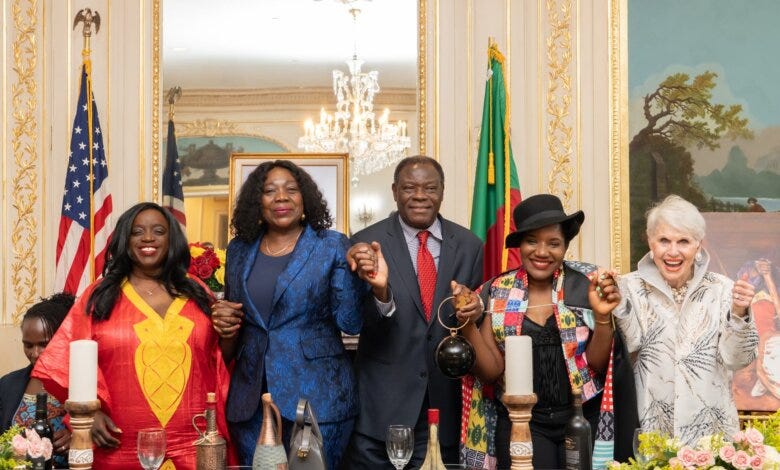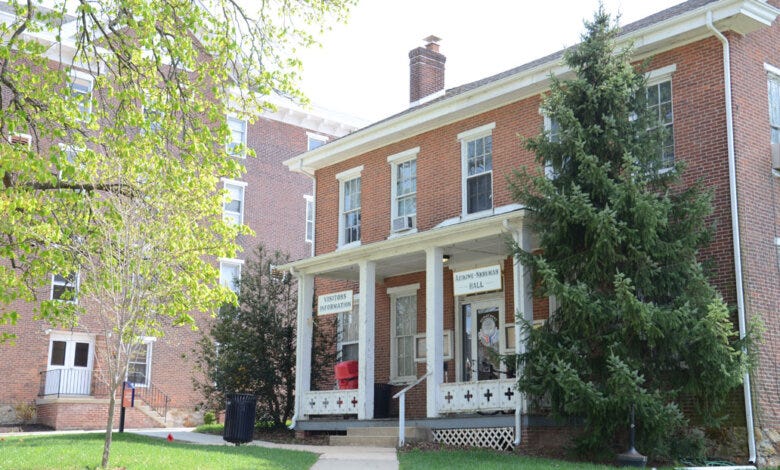The week's top highlights
Shiri Achu launches ‘first pan-African fabric’ in D.C.
The Cameroonian Embassy in Washington, D.C., transformed into a hub of culture and art as it hosted the official launch of the ‘first pan-African fabric’ by Shiri Achu Art on 25 April 2025. The remarkable evening combined the power of visual art with a unique, cultural, culinary dining experience, in celebration of African unity.
The pan-African fabric showcased symbols derived from African nations representing the North, East, South, West, and Central Africa; more specifically from countries like Egypt, Ethiopia, South Africa, Nigeria, Cameroon, Ghana, Central African Republic, Kenya, and Morocco; thus, embodying the whole of Africa.
How Lincoln University rescued the legacy of Azikiwe-Nkrumah Hall
Azikiwe-Nkrumah Hall, located at the Lincoln University in Chester County, Pennsylvania, in the United States, stands as the oldest building on the campus of America’s first degree-granting Historically Black College and University (HBCU), founded in 1854.
Azikiwe-Nkrumah Hall, originally built in 1865 during the American Civil War when the university was known as the Ashmun Institute, has served multiple roles over its 160-year history. Initially a residence for professors, it later became the African Center, a hub for cultural exchange, and more recently housed campus security and the Division of Institutional Advancement offices. Its architecture characterized by a classical design complements its historical weight.
How 12-year-old Shokunbi won $11.5 million for her DIY air filter
12-year-old Nigerian-American student, Eniola Shokunbi, from Middletown, Connecticut, in the United States, gained recognition after developing a low-cost, high-efficiency air purifier in 2022 as a fifth-grader at Commodore MacDonough STEM Academy. It was a class project aimed at addressing future pandemic challenges, and making classrooms safer.
Crafted from a box fan, four furnace filters, cardboard, and duct tape, the purifier might look unassuming, but it’s anything but ordinary. Shokunbi’s device costs $60 to assemble and has shown powerful results; it removes over 99% of airborne viruses, including COVID-19. The Environmental Protection Agency (EPA) independently tested the filter in North Carolina, confirming its effectiveness.
“My goal is to see these filters in every classroom across America,” said Shokunbi. “I want kids to go to school knowing they’re safe, healthy, and ready to learn.”
Africa Trade Consortium schedules 5th Tea Break Edition for Abuja
Africa Trade Consortium (ATC) has scheduled the 5th edition of its acclaimed “Tea Break Edition” for the Grand Pela Hotel in Durimi, Abuja, Nigeria on May 14, 2025. Organized by PR Times Africa Media Ltd, the annual gathering has become a cornerstone for advancing intra-African trade, uniting business leaders, policymakers, and diplomats to unlock new economic opportunities across the continent.
With a spotlight on the tea industry, this year’s event promises to ignite conversations that could reshape trade dynamics in Africa. Kicking off at 10AM (WAT), the Tea Break Edition will convene diverse stakeholders from across Africa, all driven by a shared goal: to strengthen economic ties and address barriers to trade.
What is Ghana’s ‘Right Of Abode’ status for people in the diaspora?
Right of Abode (ROA) status is a form of indefinite residence and confers certain settled residence rights on the holder. This includes the removal of restrictions on entry into and exit from Ghana, and restrictions on work authorisations, among others. This status is not open to all noncitizens. It is only open to people of African descent in the diaspora.
There are two types of ROA in Ghana. One is for persons who previously held Ghanaian citizenship, having renounced it in favour of the citizenship of another country. The other is for persons of African descent in the Diaspora. For the purposes of this article, the discussion focuses on the latter group, which is persons of African descent in the diaspora.
WATCH: Prof. Michael C. Campbell talks about the new skin colour genetic discovery
Howard University Department of Biology Assistant Professor Michael C. Campbell and an international team of scientists led by members of Professor Sarah Tishkoff’s lab at the University of Pennsylvania identified new variants in or near the SLC24A5, MFSD12, DDB1, TMEM138, OCA2 and HERC2 genes that are responsible for skin colour in modern humans.
Unlike prior skin-colour-research studies, which have focused on European subjects, the present study analysed genetic data from a large set of 1,570 people from populations in very remote regions in Ethiopia, Tanzania, and Botswana located in eastern and Southern Africa, which made it the first of its kind. The individuals included in this study practice different modes of subsistence and possess a broad spectrum of skin pigmentation present in Africa.










